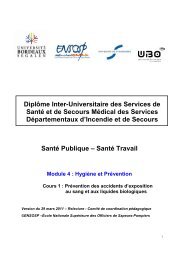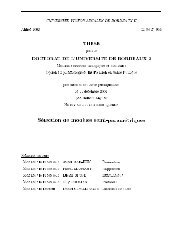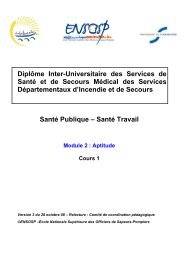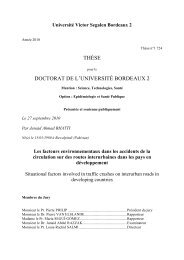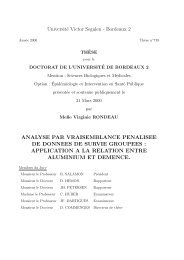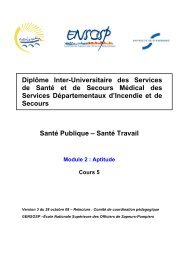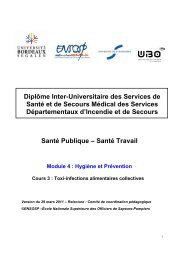Télécharger le texte intégral
Télécharger le texte intégral
Télécharger le texte intégral
You also want an ePaper? Increase the reach of your titles
YUMPU automatically turns print PDFs into web optimized ePapers that Google loves.
ABSTRACTResidual cognitive abilities and memory optimisation in Alzheimer’s diseaseAlzheimer’s disease is characterised by severe memory deficits related to the inability toconsciously recol<strong>le</strong>ct previously encountered information regarding place, peop<strong>le</strong> or events.However, some residual cognitive abilities could remain in Alzheimer’s disease allowing thepatients to access these past experiences by non-conscious means of recovery. The mainobjective of this doctoral thesis is to investigate some residual cognitive abilities and theconditions that may optimise patients’ memory performances. The first study conductedprovided results showing that implicit memory processes are preserved in Alzheimer’s diseaseincluding after quite long delays of about thirty minutes. Furthermore, through a metaanalysisincluding eighteen studies, we concluded that encoding conditions requiringgeneration or semantic elaboration processes are likely to optimise patients’ implicit memoryprocesses. Lastly, we conducted a third study investigating the difference in visuo-spatialworking memory abilities between men and women in Alzheimer’s disease. The resultsshowing that ma<strong>le</strong> patients still present a greater ability than fema<strong>le</strong>s to actively manipulatevisuo-spatial information suggest that sex could figure among the numerous variab<strong>le</strong>scontributing to modulate the clinical manifestation of the disease. Despite the severity of thecognitive deterioration in Alzheimer’s disease, these studies illustrate the persistence of somecognitive abilities and also the conditions likely to optimise the enhancement of such residualabilities. These results may have potential clinical application dedicated to improve thecognitive rehabilitation of patients' memory deficits.Key-words: Alzheimer’s disease, dementia, memory, explicit, implicit, cognitive reserve2



